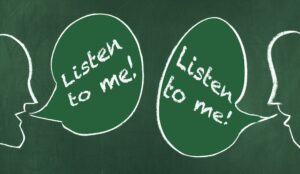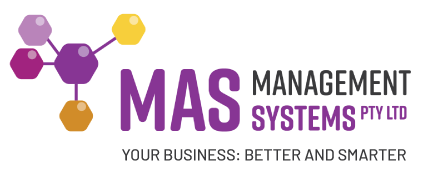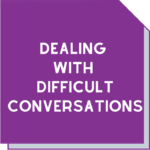Are you listening??
“Most people do not listen with the intent to understand; they listen with the intent to reply.”
So said Stephen Covey, author of ‘The 7 habits of highly effective people’.
We’ve all been guilty of this. In our recent article we discussed asking the right questions. But the best questions in the world won’t matter if you don’t listen to the answers!
Listening doesn’t require a degree. It doesn’t even require a course of study. But it is a skill you can learn and with focus and practice, you’ll soon be hearing and understanding exactly what the person you’re speaking with is saying.
Listening to hear
 How well you listen has a huge impact on every aspect of your life.
How well you listen has a huge impact on every aspect of your life.
In both personal and professional terms, improving your listening skills and conversational capability will benefit you.
Research has shown that immediately after the average person has listened to someone talk, they remember about 50% of what was said, no matter how carefully they thought they were listening.
As time passes, that memory reduces significantly. And we’re not talking about a lot of time here – recollection drops to about 25 percent within about eight hours.
Hopefully, the bit you remember from the conversation you had with your doctor was the important part!
Why is it so difficult?
We can blame our brains for this one.
Generally, people speak at around 125 words a minute. Since our brains are supercomputers, receiving this information at such a slow rate is problematic. This means that while we’re listening to the slow delivery, our brains are racing off in different directions because we still have time to think while we’re listening.
Since we have time between the phrases we’re hearing, we can sandwich our own thoughts into them. We head off on a side track, perhaps thinking about a response or remembering that we want to mention another issue before the conversation is over.
We regularly dash down these side tracks to our own thoughts and then return to grab what we think are the important bits of what the speaker is saying. Is it any wonder that we grasp less than half of what’s being said?
Barriers to listening
A relative tells you they’ve received a call from the doctor; someone phones you from the Australian Tax Office; the main speaker at an event is from a political party you don’t support. These scenarios trigger an immediate emotional response that throws up a roadblock to you really hearing. Difficult as it may be, you need to put those emotions aside to ensure you get the most out of these conversations.
There are many barriers to listening including:
The environment – the room could be too crowded, too noisy, or too cold. Whatever the case, this can be a difficult distraction to overcome.
 Trying to listen to multiple conversations – this can include having the television on while attempting to listen to someone or texting or emailing someone else during a conversation (a personal bugbear!)
Trying to listen to multiple conversations – this can include having the television on while attempting to listen to someone or texting or emailing someone else during a conversation (a personal bugbear!)
Focussing on the physical – you may find the speaker attractive (or the opposite). Perhaps they’re wearing an article of clothing you don’t like. Regardless of the reason, paying attention to their appearance means you’re not paying attention to their words.
You decided in advance you’re not interested – ever had to run a training course for participants who were ‘forced’ by their employer to attend? That room full of people with folded arms and closed minds won’t be easy to win over.
Being preoccupied – you’re worrying about a family member; you’re feeling unwell; you’re stressed about an upcoming assessment. If we have a lot on our minds, we simply don’t have the capacity to listen.
Active listening
The term active listening explains how we can listen more effectively.
Let’s look at some habits we can learn to improve our conversations and our listening skills.
Be interested not interesting. Assume you have something to learn – every person you meet, every conversation you have, will teach you something new. Open your mind to that possibility.
 Don’t multitask. A conversation needs a balance between talking and listening, so you need to be present. Put away your phone and really focus.
Don’t multitask. A conversation needs a balance between talking and listening, so you need to be present. Put away your phone and really focus.
Use open questions. We’ve discussed these previously. Questions like “How did you feel?” and “What was that like?” can help drill down into the other person’s experiences and show them you’re listening. And it can make the conversation more engaging and show you’re investing your time into it!
Repeat their words. Your brain is processing the information you’re receiving at lightning speed. If you’re finding it difficult to concentrate on what someone is saying, try repeating what they’ve said mentally. As well as reinforcing their message, this should help you stay focussed.
Just the facts ma’am. Understanding the statistics and details of what someone is telling you is one thing. But what you need to do is use those facts to understand the idea that the speaker is trying to communicate. By listening and observing other elements (such as their body language), you’ll have a better chance of hearing and distilling the idea they’re trying to get across.
Reflect what you’ve heard. As a good listener, your role is to understand what’s being said. Paraphrasing during the conversation can not only help with this process but also demonstrate that the other person is being heard. Trying asking, “So, when you say xxx, do you mean…” or “Just to clarify what you said about…” to be sure that what you’re hearing is what’s intended.
Final thoughts
Becoming a better listener can make you more effective at influencing and negotiating. As an added bonus, you’ll be more likely to avoid conflict and misunderstandings both at home and in your workplace.
Our upcoming Communication eBook will give you more hints and tips on improving communication.
This free eBook will only be sent to our subscribers so be sure to join our mailing list so you don’t miss out!
Need any more information on the services we offer? Email info@masmanagementsystems.com.au or phone Maree on 0411 540 709.
Remember, you don’t have do to this alone!
Download the article Are you listening?






